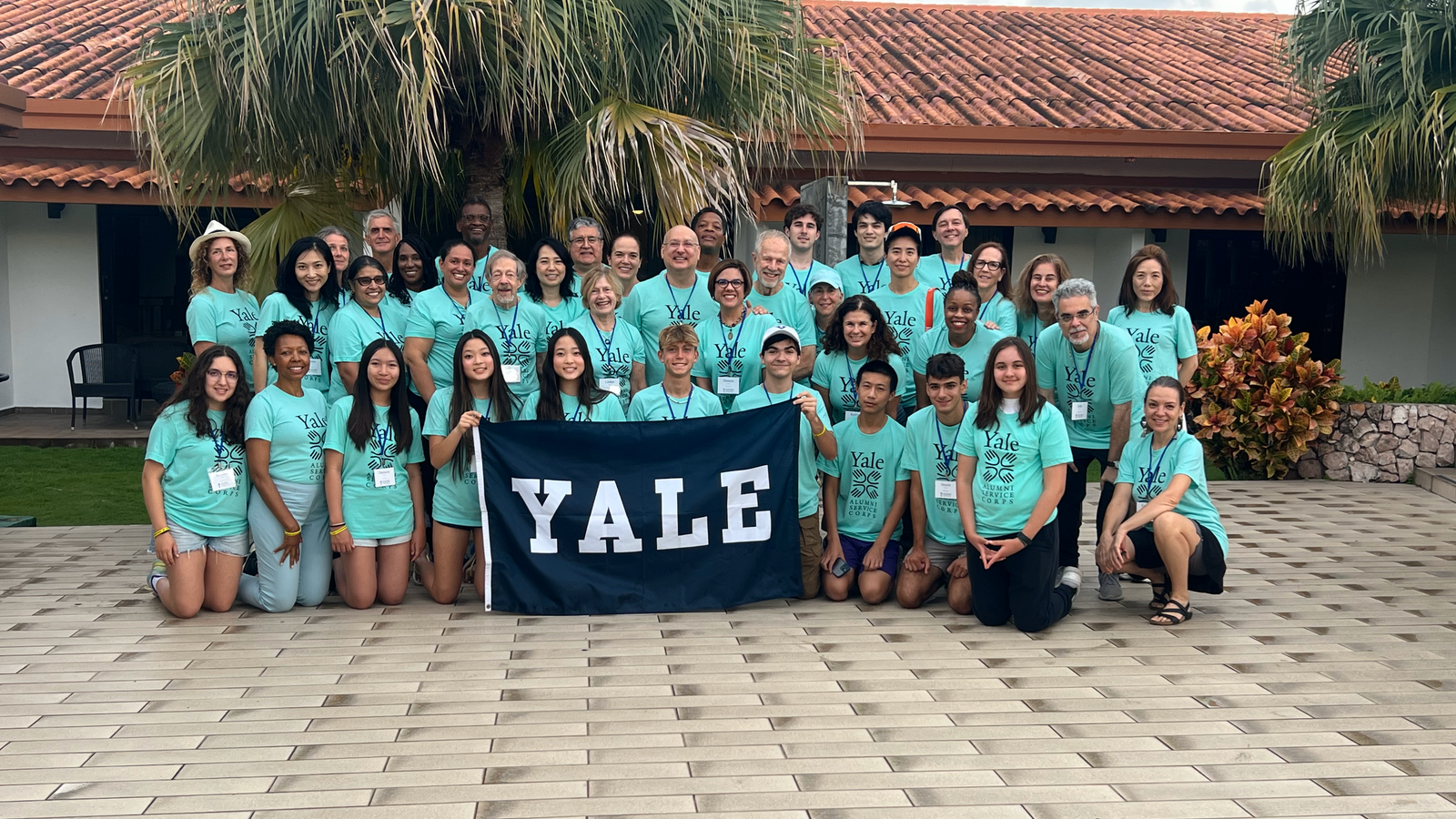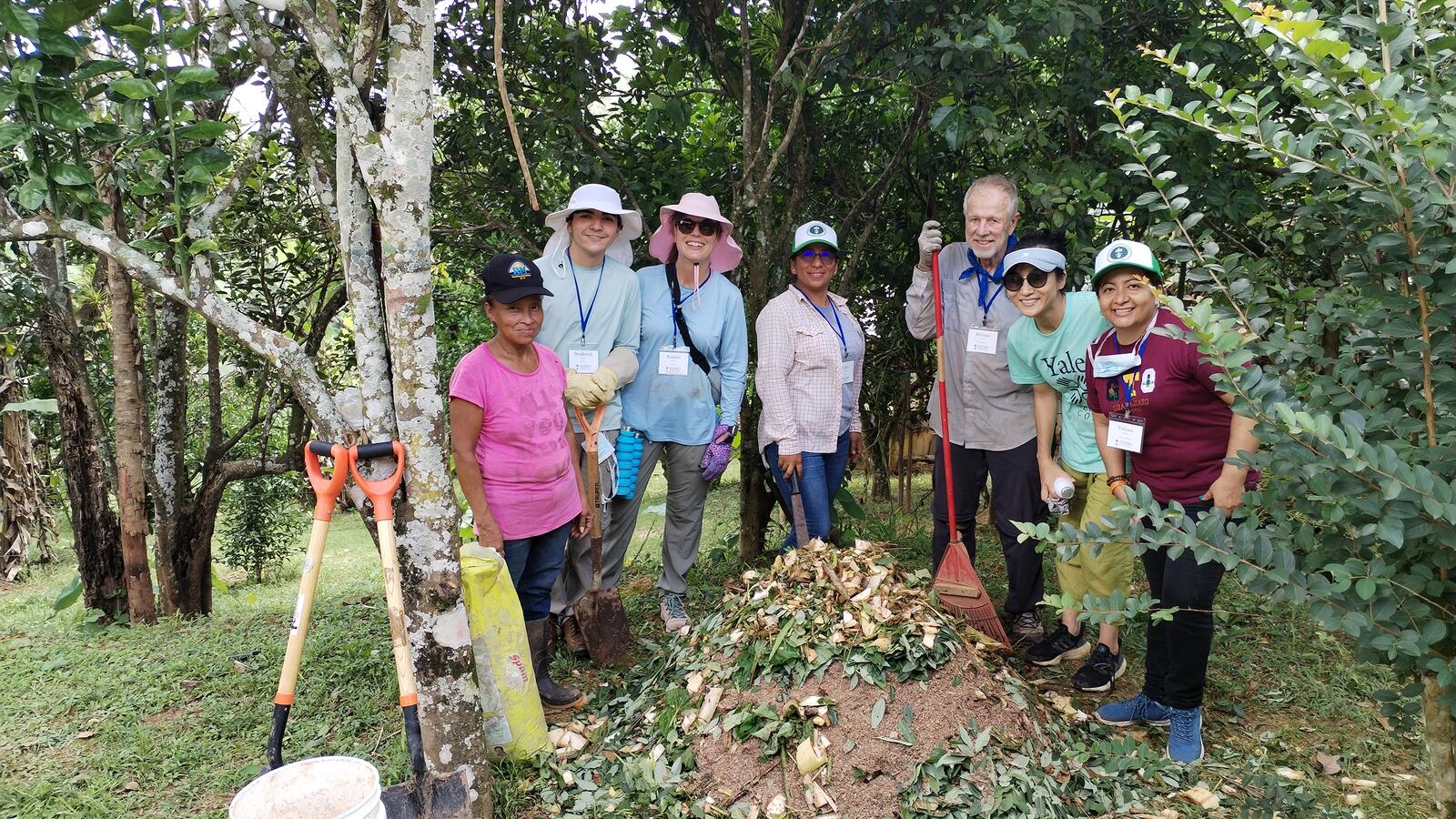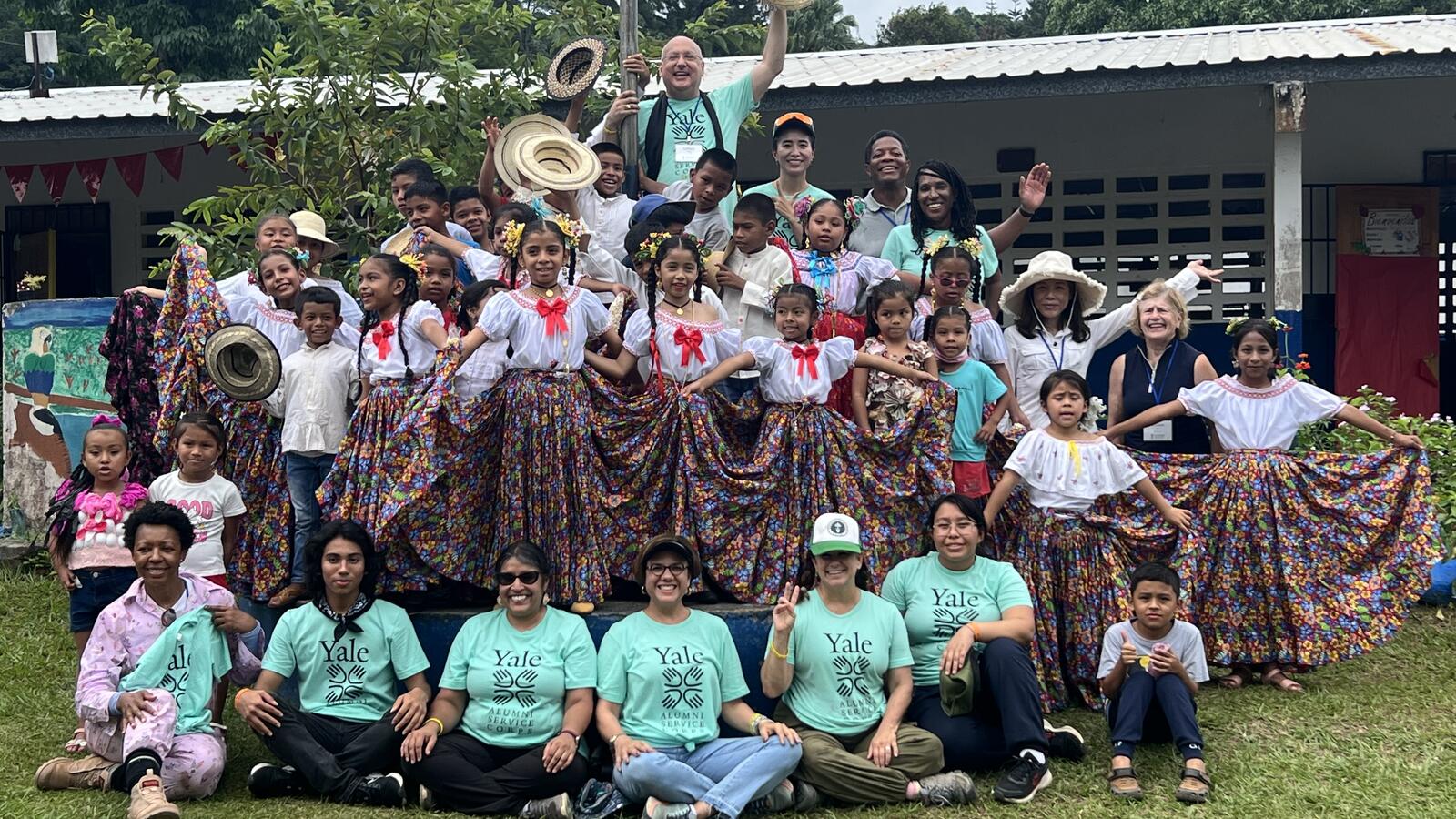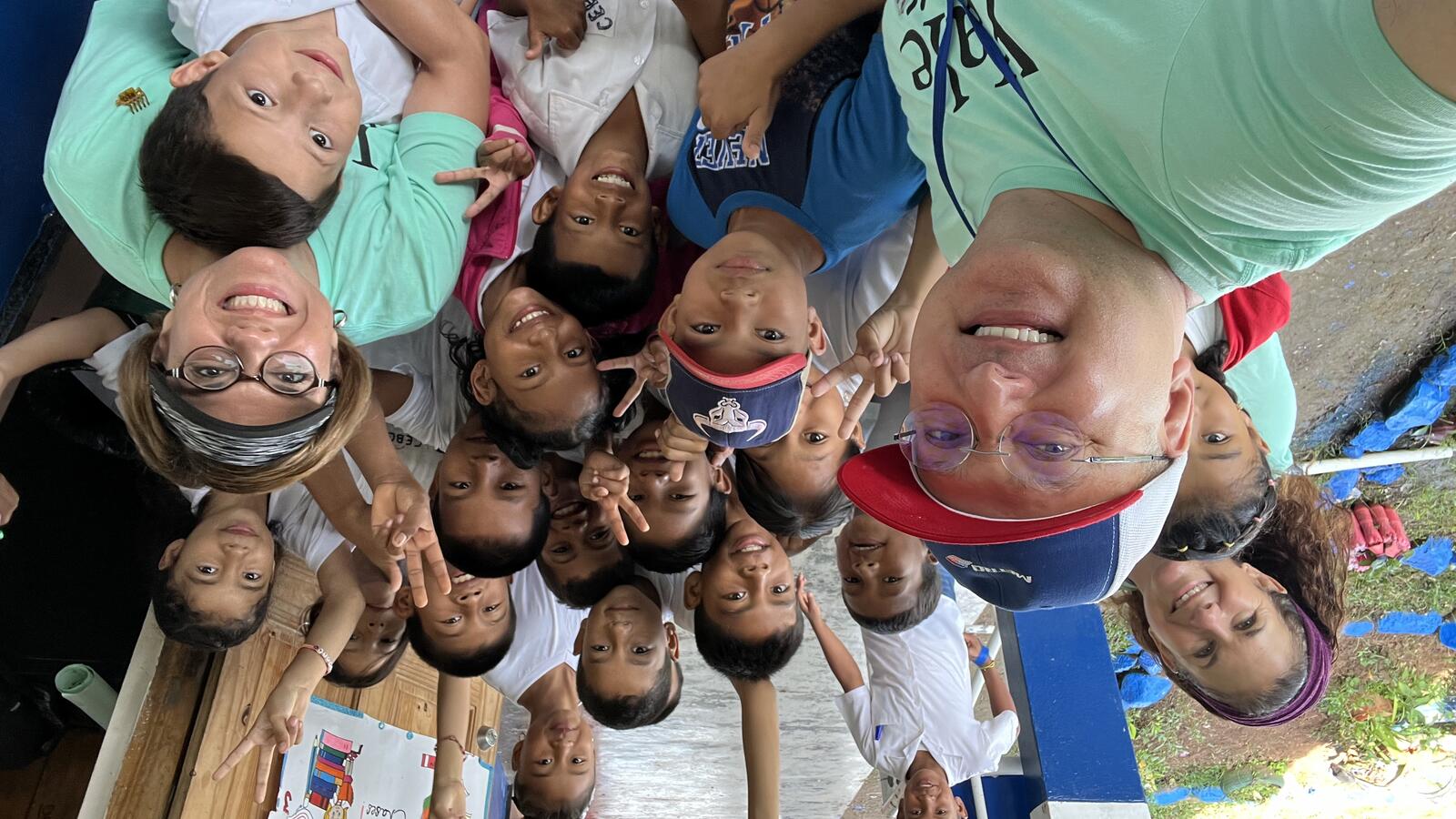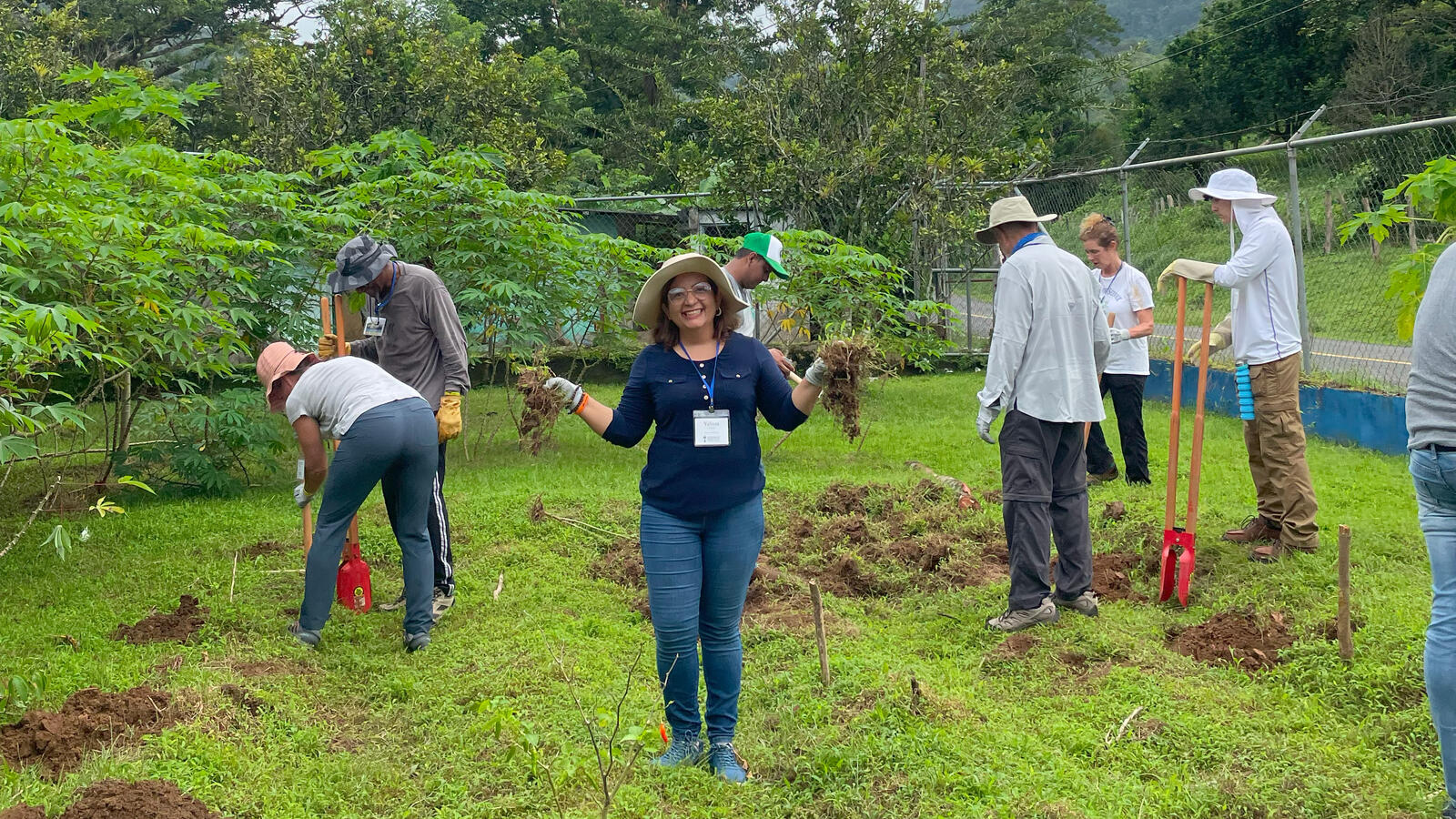YASC, SHI, and Panama: For the Benefit of the World
Over the summer, a cohort of 37 alumni, staff, family, and friends of Yale joined the Yale Alumni Service Corps (YASC) for its first volunteer service trip to Panama, where the group completed projects grounded in environmental conservation and regenerative agriculture together with Sustainable Harvest International (SHI). Founded in 1997, SHI is an international nonprofit organization that partners with Central American smallholding farmers to transition from conventional to sustainable farming toward increasing crop yields and food quality, restoring soil integrity, protecting biodiversity, improving water utilization and carbon drawdown, and driving financial stability for its affiliates. The organization accomplishes this via a 5-phase, multiyear program, whereby local field trainers recruit, educate, and work closely with participating families, from envisioning outcomes to market strategy to enabling long-term self-sufficiency beyond graduation.
As described by Florence Reed, Founder + Director of Strategic Growth for SHI, “Sustainable Harvest takes more of a hand-up rather than a handout approach. We want to make sure that by the time a family graduates from our program, they'll feel confident to continue on their own, that they'll be producing more to provide a better standard of living for their own families. They'll be able to feed themselves better, earn more income, and invest more in their families and their communities.”
Cornerstones, Milestones, and the Township of Piedras Gordas
On this journey, this 30th cohort of YASC volunteers met and worked alongside the SHI Panama team and its partner farmers from Bermejo and Piedras Gordas, two rural communities in the central Panamanian province of Coclé. Located three hours southwest of Panama City, both communities comprise families who earn their livings mostly from primary-sector economic labor, such as farming and mining, as well as some craftwork. As is often the case in YASC service areas, Bermejo and Piedras Gordas also have two public primary schools serving students in grades 1–6 as their focal points.
 Against this backdrop, volunteers spent the week leading basic English classes and reading circles, participating in workshops on health, nutrition, and natural resource conservation, assisting with community gardening and organic composting, doing arts and crafts, and helping to revitalize community spaces. They also participated in farm-based activities such as planting trees in agroforestry plots; developing plant nurseries for medicine, fruits, and vegetables; and establishing or signposting forest trails.
Against this backdrop, volunteers spent the week leading basic English classes and reading circles, participating in workshops on health, nutrition, and natural resource conservation, assisting with community gardening and organic composting, doing arts and crafts, and helping to revitalize community spaces. They also participated in farm-based activities such as planting trees in agroforestry plots; developing plant nurseries for medicine, fruits, and vegetables; and establishing or signposting forest trails.
To frame this work in the context of Panama's vital role in global ecology, the group engaged in an insightful orientation discussion with Mirei Endara de Heras ’94 MESc. Endara de Heras served as the country's first Minister of the Environment and has since co-founded and is now Board President for Marea Verde, a Panama-based nonprofit organization focused on mitigating plastic and waste pollution through local solutions. The restoration of Panama's ecosystems is crucial not only for the well-being of its diverse flora and fauna but also for the health of our planet. As the "Crossroads of the World," Panama serves as a critical conduit for biodiversity and climate regulation, impacting global weather patterns and the health of marine and terrestrial ecosystems.
Recognizing the interconnectedness between environmental health and cultural vitality, the service trip also included sightseeing around the capital, where participants briefly visited the iconic Panama Canal—one of the Seven Wonders of the Modern World—plus a handful of other historical landmarks. This exploration was complemented by performances from a regional folkloric group in Penonomé, showcasing the rich cultural heritage in this unique and ecologically significant region. Through these experiences, the volunteers gained a deeper appreciation for the importance of preserving both Panama's natural landscapes and its cultural traditions, reinforcing the idea that sustainability encompasses not only the environment, but also the communities that depend on it.
According to João Aleixo, director of service programs at the Yale Alumni Association, this service trip, provided a transformative experience for the volunteers as they engaged in meaningful work within these two underserved communities on the outskirts of Penonomé, the capital of Coclé province. “Working in collaboration with SHI, our volunteers participated in impactful projects focused on environmental conservation, regenerative agriculture, and community education, all aimed at helping to nourish both people and the planet,” Aleixo explained. He highlighted that the dedication of alumni, staff, and their families from diverse backgrounds to support these initiatives enriched the local communities and deepened the participants’ understanding of social responsibility and global interdependence. “It was inspiring to witness how our volunteers embraced the opportunity to learn from the local culture while contributing to the region's sustainability,” he added.
Sustainability in Action
By serving concurrently in two communities at different stages of the transition to regenerative agriculture, YASC volunteers also had the opportunity to see firsthand and even help accelerate progress along the arc of sustainable development in those areas. For example, SHI partner families in Piedras Gordas—where nearly one-fifth of residents aged 18 or older work in agriculture—have already completed and graduated from its 5-phase program. As a result, some of the volunteer work done in that community entailed applying principles and concepts from SHI's program at a greater scale, building upon prior efforts, or tackling work that could not be addressed previously due to resource constraints. This continuity is crucial, as it supports the families' enduring commitment to a just and sustainable future as a function of food sovereignty, ecological restoration, and community-building.
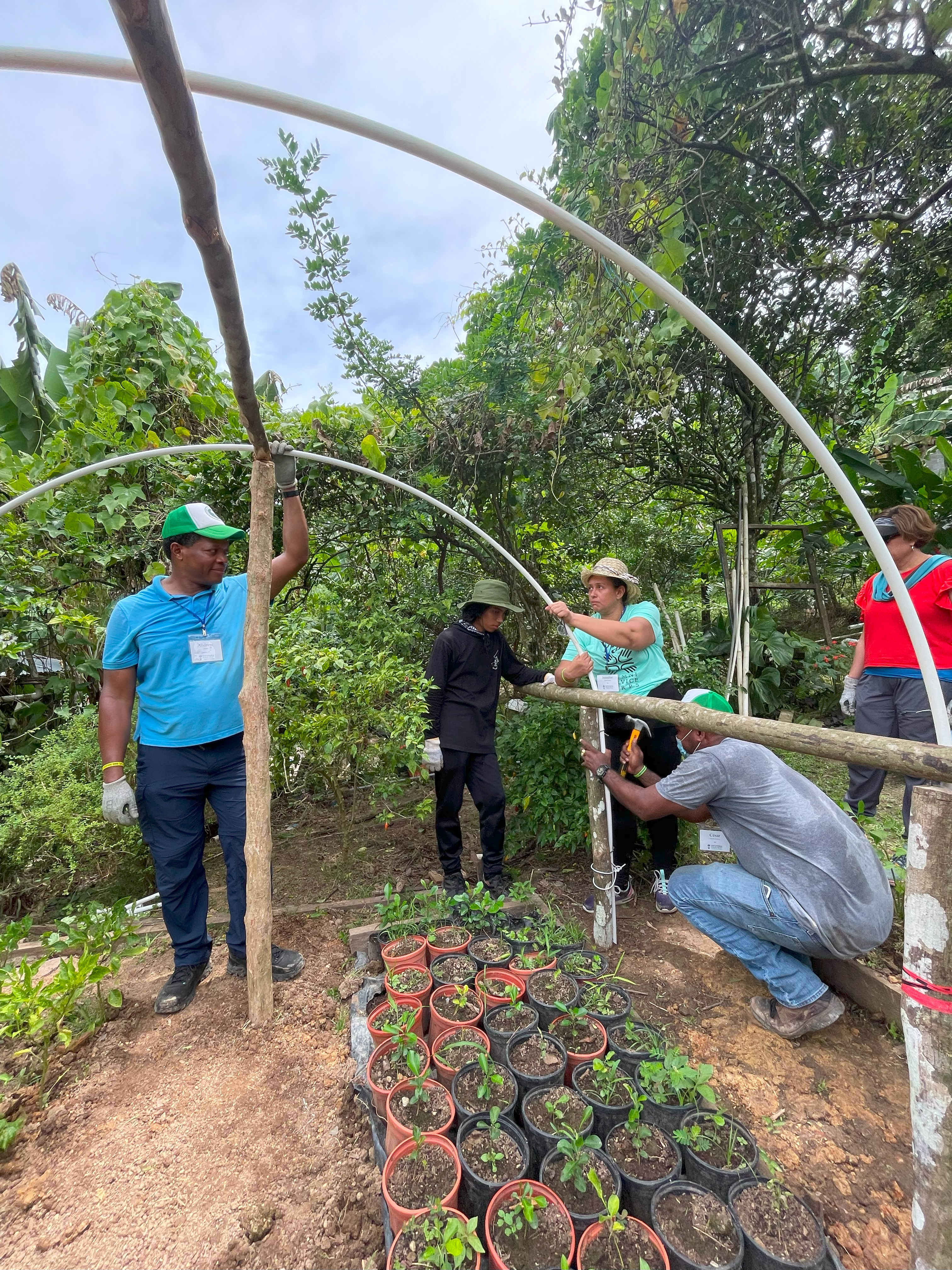 As an industrial hygienist, assistant research scientist, and Chair of the YASC Advisory Board, Andrew Burgie ’87 is vested in ensuring this continuity. His environmental health and safety expertise informs his understanding of how sustainable farming can mitigate health risks while promoting ecological balance. Through his leadership, Burgie emphasizes the critical link between personal health and safety and community well-being, reinforcing the mission of YASC in fostering resilient communities. Having first joined YASC for its 2011 program in China, the journey to Panama marked Burgie’s 10th YASC trip, where he also served as Community Liaison to the YASC volunteers assigned to Piedras Gordas throughout the week. “I was very pleased with our volunteers’ dedication to their assigned tasks. They undertook the tasks before them with wonderful positive energy, initiative, and care, whether it was strenuous agroforestry and construction work, painting school rooms and murals, or facilitating educational discussions and community team building."
As an industrial hygienist, assistant research scientist, and Chair of the YASC Advisory Board, Andrew Burgie ’87 is vested in ensuring this continuity. His environmental health and safety expertise informs his understanding of how sustainable farming can mitigate health risks while promoting ecological balance. Through his leadership, Burgie emphasizes the critical link between personal health and safety and community well-being, reinforcing the mission of YASC in fostering resilient communities. Having first joined YASC for its 2011 program in China, the journey to Panama marked Burgie’s 10th YASC trip, where he also served as Community Liaison to the YASC volunteers assigned to Piedras Gordas throughout the week. “I was very pleased with our volunteers’ dedication to their assigned tasks. They undertook the tasks before them with wonderful positive energy, initiative, and care, whether it was strenuous agroforestry and construction work, painting school rooms and murals, or facilitating educational discussions and community team building."
Ten minutes uphill from Piedras Gordas lies Bermejo, a community of nearly 300 residents, including 33 families currently in phase 3 of SHI’s program. In this phase, the partner farmers expand their focus beyond the fundamentals of sustainable farming to diversification—specifically nutritional diversity and biodiversity. This interplay between the individual, interpersonal, and environmental factors of sustainability lies at the heart of the kinds of issues that Dr. Rosalia Burke ’92 confronts in her work as an otolaryngologist, healthcare administrator, and Vice-Chair of the YASC Advisory Board. Having first joined YASC for its 2019 program in the Dominican Republic, the journey to Panama marked Dr. Burke's fourth YASC trip, where she also served as Community Liaison to the YASC volunteers assigned to Bermejo throughout the week.
Dr. Burke's leadership is rooted not only in her professional expertise but also in her commitment to family involvement in volunteer service. As a testament to the idea that sustainability and community resilience are best nurtured through familial bonds and shared experiences, she has even brought some of her loved ones along on her YASC trips. This hands-on involvement has allowed her children to witness and participate in the transformative work in underserved areas like Bermejo, deepening their understanding of the challenges and rewards of sustainable development.
Dr. Burke emphasized the importance of this holistic approach, stating, "Sustainability is not just about the environment; it's about uplifting the community and ensuring that everyone has the resources they need to thrive. When we empower families with knowledge and skills, we create a ripple effect that strengthens the entire community." She believes fostering intergenerational learning and shared experiences is essential for building resilience. "Involving families in this work deepens their connection to the land and instills a sense of responsibility for future generations," she added.
Through these efforts, Dr. Burke underscores the importance of collective action in building resilient communities, demonstrating that when people unite around a common purpose, they can create lasting change that benefits their immediate surroundings and the broader ecosystem.
Momentum, Outcomes, and Impact
Ultimately, the impact of YASC's collaboration with SHI in Panama will extend far beyond the immediate projects undertaken during this service trip. The remarkable outcomes of SHI's program to date bear this out. With 91% of graduated partner farmers continuing to use the techniques they've learned and still growing their own food, the program engenders a lasting commitment to ecological stewardship, food security, and greater resilience within the communities it serves. Furthermore, the newfound economic stability that many partner farmers experience allows them to invest in education, healthcare, and a host of other priorities for their families, fostering a cycle of growth that uplifts everyone involved.
 The experiences shared by YASC volunteers, the SHI team, and the local farmers highlight another subtle but equally powerful point of transformation: individuals reclaiming their sense of worth and capability through sustainable practices and community engagement. Florence Reed encapsulates this beautifully with the words of one graduated partner farmer who declared, “I think the most important thing is that I think of myself as an important woman now and I used to believe I had no value in the world because I couldn't even feed my children enough. And now I'm feeding my children. I'm supporting my community. I'm teaching my community. I'm helping the environment for everybody in the world. And I feel like I'm important now.”
The experiences shared by YASC volunteers, the SHI team, and the local farmers highlight another subtle but equally powerful point of transformation: individuals reclaiming their sense of worth and capability through sustainable practices and community engagement. Florence Reed encapsulates this beautifully with the words of one graduated partner farmer who declared, “I think the most important thing is that I think of myself as an important woman now and I used to believe I had no value in the world because I couldn't even feed my children enough. And now I'm feeding my children. I'm supporting my community. I'm teaching my community. I'm helping the environment for everybody in the world. And I feel like I'm important now.”
This powerful testament speaks to the heart of the mission—restoring dignity by nurturing both people and the planet. As we reflect on these achievements, it becomes clear that when individuals recognize their intrinsic value and capacity for change, they elevate themselves and inspire those around them. Together, we can continue championing these ideals, fostering a world where every person feels empowered to make a difference.

